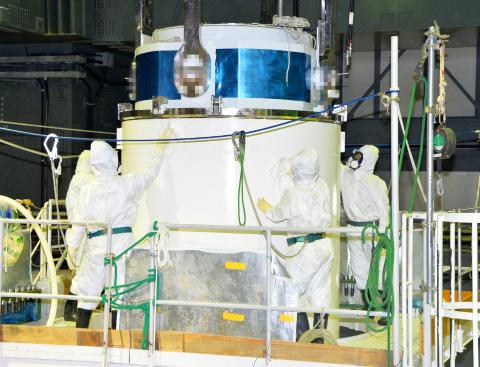The cleanup of Japan’s devastated Fukushima Dai-ichi nuclear power plant passed an important milestone on Saturday when the plant’s operator announced it had safely removed the radioactive fuel from the most vulnerable of the four heavily damaged reactor buildings.
Tokyo Electric Power Co (TEPCO) removed the remaining fuel rods from the ruined No. 4 reactor building, putting the rods inside a large white container for transportation to another, undamaged storage pool elsewhere on the plant’s grounds. The company had put a high priority on removing about 1,500 fuel rods from the unit because they sat in a largely unprotected storage pool on an upper floor of the building, which was gutted by a powerful hydrogen explosion during the March 2011 accident.
This led to fears of additional releases of radioactive material if the pool was damaged further, such as by an earthquake. By succeeding in the technically difficult task of extracting the rods, TEPCO eliminated one of the plant’s most worrying vulnerabilities. This is also the first time that fuel has been removed from one of the four wrecked reactor buildings.

Photo: AFP
It took almost four years to reach this goal, as the cleanup has been plagued by mishaps and a so far unstoppable flow of groundwater that has flooded the basements of the crippled reactor buildings.
The aging Fukushima Dai-ichi plant suffered a triple meltdown when a huge earthquake and tsunami struck on March 11, 2011, knocking out cooling systems.
TEPCO still faces the far more challenging task of removing the ruined fuel cores from the three reactors that melted down in the accident. These reactors were so damaged — and their levels of radioactivity remain so high — that removing their fuel is expected to take decades. Some experts have said it might not be possible at all, and have called instead for encasing those reactors in concrete.
The fuel cores from the three reactors are believed to have melted like wax as the uncooled reactors overheated, forming lumps on the bottom of the reactor vessels. Scientists have said that the hot, molten uranium might have even melted through the containment vessels, possibly reaching the floor of the reactor buildings or even the earth beneath.

NATIONAL SECURITY THREAT: An official said that Guan Guan’s comments had gone beyond the threshold of free speech, as she advocated for the destruction of the ROC China-born media influencer Guan Guan’s (關關) residency permit has been revoked for repeatedly posting pro-China content that threatens national security, the National Immigration Agency said yesterday. Guan Guan has said many controversial things in her videos posted to Douyin (抖音), including “the red flag will soon be painted all over Taiwan” and “Taiwan is an inseparable part of China,” while expressing hope for expedited “reunification.” The agency received multiple reports alleging that Guan Guan had advocated for armed reunification last year. After investigating, the agency last month issued a notice requiring her to appear and account for her actions. Guan Guan appeared as required,

Japan and the Philippines yesterday signed a defense pact that would allow the tax-free provision of ammunition, fuel, food and other necessities when their forces stage joint training to boost deterrence against China’s growing aggression in the region and to bolster their preparation for natural disasters. Japan has faced increasing political, trade and security tensions with China, which was angered by Japanese Prime Minister Sanae Takaichi’s remark that a Chinese attack on Taiwan would be a survival-threatening situation for Japan, triggering a military response. Japan and the Philippines have also had separate territorial conflicts with Beijing in the East and South China

A strong cold air mass is expected to arrive tonight, bringing a change in weather and a drop in temperature, the Central Weather Administration (CWA) said. The coldest time would be early on Thursday morning, with temperatures in some areas dipping as low as 8°C, it said. Daytime highs yesterday were 22°C to 24°C in northern and eastern Taiwan, and about 25°C to 28°C in the central and southern regions, it said. However, nighttime lows would dip to about 15°C to 16°C in central and northern Taiwan as well as the northeast, and 17°C to 19°C elsewhere, it said. Tropical Storm Nokaen, currently

PAPERS, PLEASE: The gang exploited the high value of the passports, selling them at inflated prices to Chinese buyers, who would treat them as ‘invisibility cloaks’ The Yilan District Court has handed four members of a syndicate prison terms ranging from one year and two months to two years and two months for their involvement in a scheme to purchase Taiwanese passports and resell them abroad at a massive markup. A Chinese human smuggling syndicate purchased Taiwanese passports through local criminal networks, exploiting the passports’ visa-free travel privileges to turn a profit of more than 20 times the original price, the court said. Such criminal organizations enable people to impersonate Taiwanese when entering and exiting Taiwan and other countries, undermining social order and the credibility of the nation’s